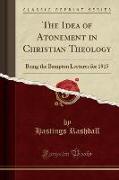- Start
- The Idea of Atonement in Christian Theology
The Idea of Atonement in Christian Theology
Angebote / Angebote:
Excerpt from The Idea of Atonement in Christian Theology: Being the Bampton Lectures for 1915
Than will be found in these pages. But there are some advantages in beginning with an enquiry into the former subject. The need for further study and bolder expression is here peculiarly pressing, and is perhaps more widely felt than in any other region. On the one hand, the idea that we are to be saved through Christ, and in some sense through His Cross, is much dearer to the hearts of most religious people than any technical presentation of the incarnation it is, indeed, very largely through its bearing upon the practical question, How am I to be saved P that the doctrine of Christ's divinity interests them at all. On the other hand, there has been far more that is definitely irrational, repellent, and immoral in many theories of the atonement than there has been in any accepted theory of the incarnation. The revolt against these theories is, indeed, already pretty general but the way to a healthier and more modern presentation of the subject is blocked by the surviving débris of shattered systems. Moreover, there has been far more variation in the Church's teaching on this subject than there has been as regards the doctrines of the Holy Trinity or of the incarnation. The doctrine of the atonement has never been defined by any Creed or general Council of the Church. The Creeds indeed decide no question connected with the subject which has ever been matter of dispute among Christians. The Apostles' Creed says literally nothing about it the Creed com mouly called Nicene or Constantinopolitan confines itself to the bare statements that the Son of God for us men and for our salvation came down from heaven, and, that He was crucified for us. No Council that can possibly claim ecumenical authority has ever gone beyond such simple statements and, if we look at the whole course of development from the New Testament to the end of the scholastic period, there is no subject upon which less of a consensus patrum can be alleged than on the question, In what sense and for what reason can Christ be said to have died for us? In these circumstances there is perhaps some hope of getting a hearing even in conservative circles for a theological.
About the Publisher
Forgotten Books publishes hundreds of thousands of rare and classic books. Find more at www.forgottenbooks.com
This book is a reproduction of an important historical work. Forgotten Books uses state-of-the-art technology to digitally reconstruct the work, preserving the original format whilst repairing imperfections present in the aged copy. In rare cases, an imperfection in the original, such as a blemish or missing page, may be replicated in our edition. We do, however, repair the vast majority of imperfections successfully, any imperfections that remain are intentionally left to preserve the state of such historical works.
Folgt in ca. 5 Arbeitstagen
